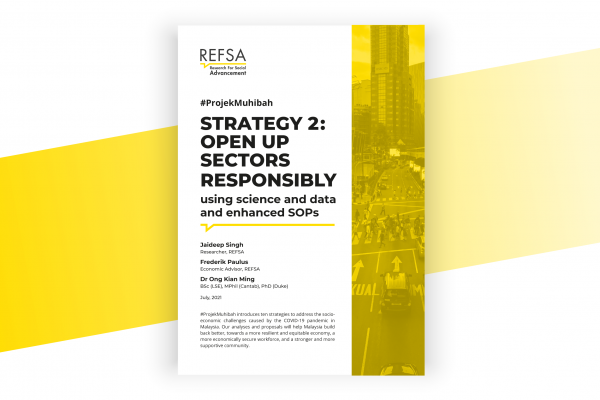Click here for brief summary in infographics
With the indefinite extension of FMCO currently in place (until daily cases dip below 4000), an estimated 90,000 businesses might cease operations. However, saving lives and livelihoods should not be a trade-off for governments. Rather than brute lockdowns and adopting a ‘wait-and-see’ approach, guidelines should be tailored in accordance with inputs from industry players and scientific data.
In #ProjekMuhibah Strategy 1, we highlighted the importance of controlling the spread of the virus, with what many public health experts and policy makers have advocated for – the FTTIS+V framework.
In #ProjekMuhibah Strategy 2, we highlight the importance of opening up economic sectors responsibly based on science and data-enhanced Standard Operating Procedures (SOPs). There is a need to develop a more proactive approach so businesses can operate as close to normalcy as possible, whilst we combat the virus.
In this policy brief, we urge the government to take the following actions to minimise both health and economic impacts of COVID-19:
1. Selective reopening of sectors
- With the availability of MySejahtera check-ins and tracing data, sectors with low incidence of transmission should be looked into and arranged for gradual re-opening;
- As the latest scientific evidence suggests that the transmission of COVID-19 is airborne 1 , current SOPs should evolve to account for indoor air quality. This necessitates a co-operation with relevant sectors to monitor ventilation and air quality effectively. For example, Belgium’s COVID-19 Commissariat calls for the CO2 content in indoor spaces not to exceed 1200 ppm under any circumstances. They also have a specialised Ventilation Task Force that has prepared recommendations for monitoring ventilation and air quality during the pandemic.
- Private-public cooperation is crucial in drafting SOPs for business premises/workplaces to ensure practicality and effectiveness;
- Phases 2 and 3 of the National Recovery Plan (NRP) should include efforts to allow sectors to reopen, and eliminate the distinction between essential and non-essential sectors;
- Cautious reopening to travel should be introduced, with consideration of travel bubbles that limits the interaction between individuals;
- Malaysia should reopen schools in stages based on the substitutability between home-based and classroom-based learning, with strict SOPs for school-going children. For example, check out government policy in Portugal and the UK specifically included the reopening of schools as part of earlier phases of their easing of lockdown rules.
2. A comprehensive, consistent, and dynamic approach to SOPs
- NRP should provide a comprehensive and detailed framework on re-openings to reduce uncertainty. For example, Portugal’s Lockdown Easing Plan is a useful case study in this regard as it provided clear guidelines at every stage, with emphasis on minimising indoor activity and crowding while balancing the needs of businesses;
- Consistent enforcement of SOPs – double standard treatment should not happen;
- SOPs should be adjusted dynamically in accordance with the vaccination rate and the fluid nature of the crisis.
All in all, a one size fits all strategy will not help in resolving the country’s ailing economy. Apart from utilising the latest scientific findings, strong communication should be established between the government, industries, stakeholders, and the public when formulating SOPs.
Read press release about this strategy HERE (English), HERE (Malay) and HERE (Chinese)
Click here for brief summary in infographics
About Projek Muhibah
#ProjekMuhibah introduces ten strategies to address the socio-economic challenges caused by the COVID-19 pandemic in Malaysia. Our analyses and proposals will help Malaysia build back better, towards a more resilient and equitable economy, a more economically secure workforce, and a stronger and more supportive community.

